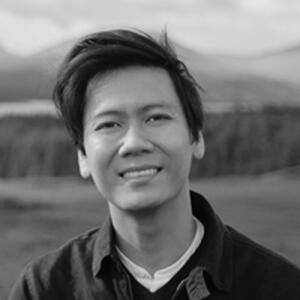Artist in Residence
Glenn Gear is a filmmaker and multi-disciplinary artist currently based in Montreal, Quebec, originally from Newfoundland. The emerging artist is featured in INUA, the inaugural exhibition of Qaumajuq and has been long-listed for the 2021 Sobey Art Awards!
Gear’s work was also projected this winter on the two connected WAG-Qaumajuq buildings as part of Qaumajuq365, the Inuit art centre’s inaugural year.
Kimutsiijut (dog team) follows a caravan of “ghost dogs” running wild across the frame of the animation. These dogs mark a traditional way of life for Inuit who have depended on dog teams for access to the land, hunting, and travelling. The ghost dogs also recall the brutal dog slaughters that occurred across the Canadian North from the 1950s-1970s, meant to move Inuit off the land in an effort to ‘civilize’ them. Gear’s ghost dogs return in this work as resilient spirits to tell their story, as they run towards a place that promises to be more empathetic, inclusive, and just.





